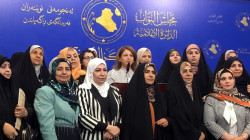Silenced and suffering: unveiling the harsh realities of working women in Iraq

Shafaq News / Given the dual challenges women face in the workplace, particularly in the private sector, including the insidious practices of exploitation, extortion, and harassment, which at times escalate to the immoral act of sexual coercion in exchange for salary increments or reduced workloads, experts have unveiled that an alarming number of working women remain oppressed and are largely oblivious to their legal rights.
Iraqi working women face numerous challenges, particularly in the private sector, as well as pressures from various areas of life. However, because of the country's deteriorating economic situation, they are compelled to accept jobs that may violate their rights regarding working hours or wages. Some are reportedly forced to "make concessions to get along with their affairs."
"My friend had to resign"
According to Ruqayya, a market employee from Babel, "when female employees reject their employers, they start to stress them out at work and make them work for longer hours."
"On the other hand, the brothers or fathers of female employees do not approve of them being late at work. Also, some have responsibilities to care for their families, children, and houses. This occurred to one of my friends, whose family forbade her from working late hours, which affected her psychologically and financially."
Lack of empathy
Um Narjes, a 50-year-old employee from Diwaniyah, discussed the difficulties she encounters when harvesting beans in one of the governorate's factories, "We face the problem of the lack of empathy with the elderly in the job."
"Employers strain the elderly in the workplace and during harvest season, while young girls receive care and attention, which causes us physical and psychological fatigue."
Countless challenges
According to activist and human rights advocate Sarah Jassim, "Iraqi working women face additional obstacles compared to men, especially in the private sector, in terms of exploitation, extortion, and harassment, particularly since certain corporations increase working hours in violation of workers' rights."
"Some women resign, but others are compelled—despite knowing that their rights are being violated—to make various concessions in exchange for a higher salary or shorter hours in order to manage their affairs and sustain their families in light of the worsening economic situations."
"Oppressed and do not know their rights"
Atheer al-Abadi, vice president of the Workers' Union in Basra, noted, "the Workers' Union holds educational courses and workshops to educate women about the labor law."
"Many working women in the private sector are oppressed and are not aware of their rights, one of which is that they are required to work for only eight hours a day, interspersed with an hour of rest."
Labor Law
Human rights activist Azhar al-Dulaimi stated, "The Labor Law stipulates that both men and women must work 40 hours a week, spread out over five days from Sunday to Thursday, at an average rate of eight hours per day. In the private sector, the contract is binding on both sides, and if any party violates it, a lawsuit may be filed if the employee is of legal age."
She added to Shafaq News Agency, "However, underaged employees in the private sector are not covered by an employment contract. Therefore, their rights are violated in terms of wages and overtime, and the Ministry of Labor was asked to address this aspect. However, no action has been taken."
